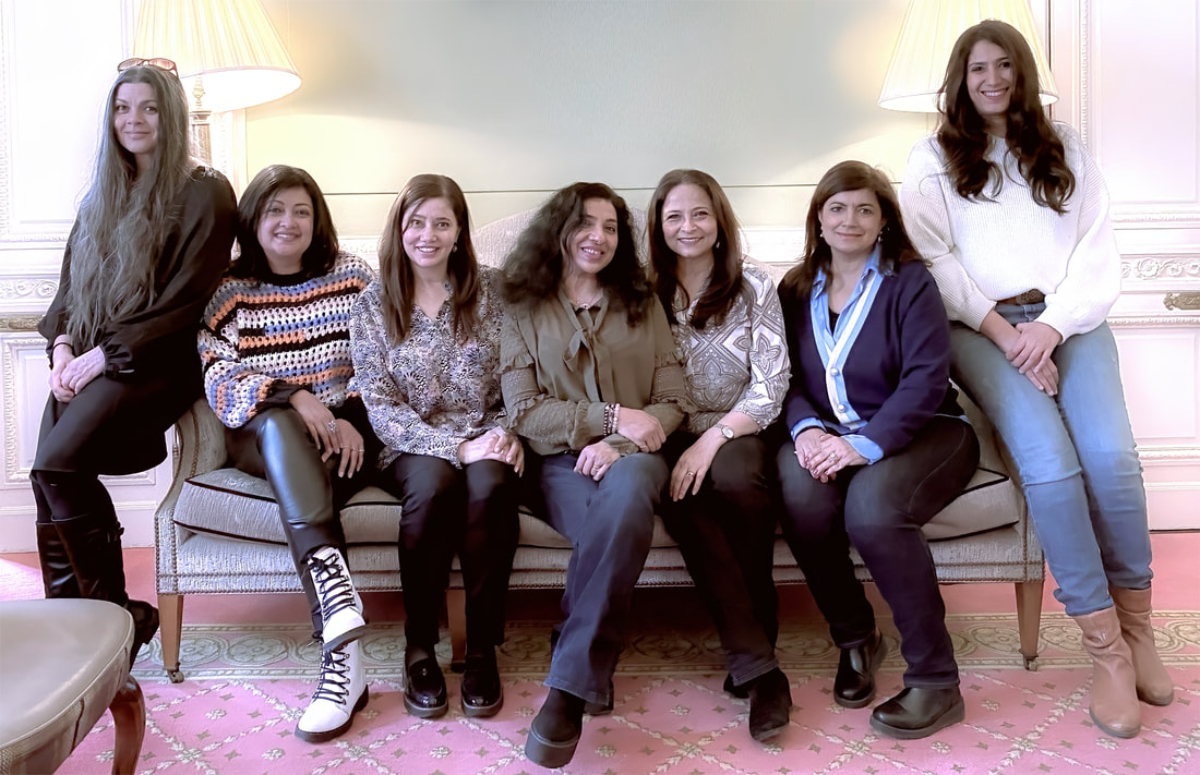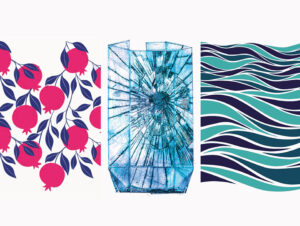Nadia Kabir Barb gives us The Whole Kahani
The Whole Kahani (The Complete Story) is a collective of British fiction writers of South Asian origin. I had the pleasure of joining in 2017. Founded by Kavita A. Jindal and Dr Reshma Ruia, the group came together in 2011 to provide a rich, creative perspective that straddles cultures and boundaries, and reflects the contemporary world.
The current members are Reshma Ruia, Kavita A. Jindal, Mona Dash, Catherine G. Menon, Deblina Chakrabarty, Radhika Kapur and Khadija Rouf. The group is unique in that we collaborate, workshop and publish collectively. Our Anthologies are: Love Across a Broken Map (Dahlia Publishing, 2016), May We Borrow Your Country (Linen Press, 2019) which was shortlisted for 2019 Saboteur Award, and Tongues and Bellies (Linen Press, 2021) which won the 2024 Eastern Eye Award for Fiction.
Being part of The Whole Kahani offers a sense of community and freedom to explore and experiment with our writing. Although writing is often considered a solitary profession, this collective allows writers to share themes and experiences without fear of judgment. Rather than hindering individual creativity, group membership enhances it through structured meetings and valuable peer critiques.
As British fiction writers of South Asian origin, we constantly face challenges related to representation. All too frequently, we are lumped together as a part of some greater amorphous umbrella or collective. Homogenising such a diverse group into one category is reductive. It strips us of our individual identities. The beauty of diversity is the individual or personal experiences and unique perspectives that we bring with us. Unfortunately, we often find ourselves confined to stereotypes based on race, ethnicity or community. The Whole Kahani challenges this and aims to break free from this typecasting.
As British fiction writers of South Asian origin, we constantly face challenges related to representation
Our members hail from various cultural backgrounds, each contributing a unique perspective to our writing. These diverse influences infuse our work with richness and depth, allowing us to explore themes and characters from multifaceted angles. Our distinct sensibilities shape our writing styles, characterisations, and thematic choices. Whether it’s lyrical prose, sharp wit, or poignant narratives, our individual voices weave a vibrant tapestry within the collective. We do not rely on shared experiences. Instead, we celebrate our differences. Our narratives emerge from personal journeys, memories, and reflections, creating a mosaic of storytelling. While we share a British South Asian heritage, we defy stereotypes. Our characters break moulds, our themes subvert expectations. Even when given the same subject, we approach it from diverse angles. These varied viewpoints enrich our collective, fostering growth and expanding our literary horizons. In summary, our collective thrives on diversity and individuality.
At the Whole Kahani, we operate as a democracy. Whether it is regarding membership, selecting an anthology theme or deciding on a title, we rely on voting. Every member has a voice.

Becoming a part of the group is often a lengthy process as membership never exceeds more than ten writers. When a member leaves or takes a sabbatical, a spot becomes available for a new member. After the new member submits writing samples, the group votes and the majority decides. Unlike many other writers’ groups, we hold monthly in-person meetings where regular attendance is required and we rotate the role of meeting coordinator. We follow a structured agenda during these sessions and circulate minutes afterwards including any action points. During the sessions, up to four stories are workshopped, and members provide comments and suggestions. The feedback we receive from our fellow writers is invaluable for improving our craft.
The Whole Kahani’s democratic approach fosters camaraderie and ownership with decisions being put to a vote, though this has sometimes resulted in amusing situations. For instance, the title Tongues and Bellies reflects themes related to food, cultural identity, and memory. The stories play with lies and truth. Characters, like chameleons, grasp at worlds just out of reach. Clues – old recipes, robots, keys – reveal glimpses of who they were or hope to become. But when we were choosing the title, our group faced a delightful challenge: an abundance of suggestions, in fact too many. After numerous rounds of voting, we finally settled on the evocative title Tongues and Bellies with a collective sigh of relief.
The Whole Kahani’s democratic approach fosters camaraderie and ownership
The anthology was written in 2020 during lockdown and published in 2021 with an online launch. Despite the challenges of remote workshopping during online meetings, our collective friendship sustained us through regular communication, shared encouragement, and virtual support. We exchanged feedback, celebrated milestones and stayed connected via online platforms. On a personal level, it helped us navigate adversity, while professionally, we supported each other to keep writing. So it was especially rewarding to have won the 2024 Eastern Eye Award for fiction for Tongues and Bellies.
In May We Borrow Your Country, the theme revolves around belonging and the concept of home. The stories delve into identity, displacement and the search for a sense of place. The decision for both the theme and title was almost immediately unanimous. We were fortunate to have a sold out event at Waterstones Gower Street with over a hundred attendees and subsequently the anthology went on to be shortlisted for the 2019 Saboteur Awards.
Love Across a Broken Map explores love’s permutations, inconsistencies, and delusions. It traverses cultural, racial, and ethnic boundaries, celebrating both heartbreak and resilience.
Awais Khan, author of No Honour, said Tongues and Bellies was “Rich, incisive and at times magical, this is a collection to be savoured and cherished. A joy from start to finish”. Asma Khan, celebrity chef and owner of Darjeeling Express, said: “The best kind of short stories are those that leave you with unanswered questions. This collection of stories does that and more!” Preti Taneja, winner of the Desmond Elliot Prize, praised May We borrow Your Country as being “A rich collection … with dry humour and poetic verve”.
As individual writers and as a collective, we often find ourselves straddling two or more worlds. Breaking into the publishing industry is no mean feat. What we truly need is for publishers to level the playing field, providing us with an opportunity to share our stories and allowing the quality of the writing speak for itself. Danuta Kean wrote that writers of colour often find they are advised to make their manuscripts marketable by “upping the sari count … or some other image that conforms to white preconceptions”. Agents and publishers aim to make our writing marketable but not at the cost whitewashing or exoticizing it. Readers are far more discerning than they are often given credit for.
Interestingly, independent publishers appear more willing to take a chance on writers of colour
Interestingly, independent publishers appear more willing to take a chance on writers of colour. Linen Press, a small independent publisher run by women for women and the only indie women’s press in the UK, published both May We Borrow Your Country and Tongues and Bellies. And Love Across a Broken Map was published by Dahlia Publishing, another small independent publisher based in Leicester who champion regional and diverse voices and contemporary, original fiction.
The fundamental ethos of The Whole Kahani is mutual respect for one another and a deep friendship. A sounding board and safety net. We not only write together, but we also socialise as a friend group.
For further information, please visit our website, thewholekahani.com.
Reshma Ruia is an award-winning author and poet. Something Black in the Lentil Soup is her first novel. Her second novel manuscript, A Mouthful of Silence, was shortlisted for the 2014 SI Leeds Literary Prize, published as Still Lives in June 2022 and awarded the 2023 Diverse Book Readers’ Choice Award in October 2023. Her short stories and poems have appeared in British and International anthologies and magazines and have been commissioned for BBC Radio 4. Her poetry collection, A Dinner Party in the Home Counties, won the 2019 Debut Word Masala Award. Mrs Pinto Drives to Happiness (2021) is her short story collection. She is the co-founder of The Whole Kahani, fiction editor of Jaggery magazine and book reviewer for Words of Colour.
Mona Dash is the author of A Roll of the Dice : a story of loss, love and genetics (Linen Press, 2019), winner of the Eyelands International Book Awards for memoir (2020), and Let Us Look Elsewhere (Dahlia Books, 2021) – a finalist in the Eyelands Book Awards 2021 and Tagore Literary Prize 2023. Her stories have been showcased on BBC Radio 4 and in the Best British Short Story anthology. Her other published books are A Certain Way, Untamed Heart, and Dawn-drops. Her work has been listed in competitions such as Novel London 20, SI Leeds Literary award, Fish, Bath, Bristol, Leicester Writes and Asian Writer, and featured in international journals. She is head of AI sales, Europe in a global technology company.
Deblina Chakrabarty is a freelance writer and a Bombayite who relocated to London six years ago. Since 2005 she’s written for various publications in India including Times of India, DNA, Man’s World, and various other dailies as well as magazines. She works for international distribution at a major Hollywood studio.
Catherine Menon is Australian-British, has Malaysian heritage and lives in London. She is a University lecturer in robotics. Fragile Monsters is her debut novel. Her short story collection, Subjunctive Moods, was published by Dahlia Publishing in 2018. Her short stories have won or been placed in a number of competitions, including the Fish, Bridport, Bare Fiction and Short Fiction Journal awards. Her work has been broadcast on radio, and she’s been a judge for several international short fiction competitions.

